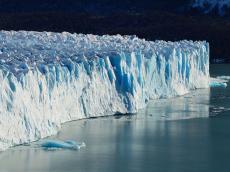|
|
TODAY.AZ / World news
Rapid melting of glaciers increases the risk of global catastrophe
25 February 2025 [09:00] - TODAY.AZ

By Alimat Aliyeva
Scientific studies conducted in recent years show that climate change is leading to the accelerated melting of glaciers.
According to a new study published in Nature, more than 5 percent of the world's glaciers have melted on average since 2000, and this process has sped up over the past decade.
The study indicates that the melting of approximately 7 trillion tons of glaciers over the past 23 years has contributed to a sea level rise of about 2 centimeters. The Alps, in particular, have become one of the regions where this melting is most pronounced. The shrinking mass of glaciers not only threatens the supply of drinking water for millions of people, but also increases the risk of flooding in coastal areas due to rising sea levels.
According to the study, glaciers have lost more than 6,500 billion tons of mass since the beginning of the 21st century. Between 2000 and 2011, glaciers melted at an average rate of 231 billion tons per year. However, between 2012 and 2023, this rate increased to 314 billion tons annually. In 2023, a record 548 billion tons of glacier mass were lost.
The rate of glacier melting is faster than the mass loss of ice sheets in Greenland and Antarctica. Particularly in the Alps, around 40 percent of glaciers have disappeared since 2000. In regions such as the Middle East, New Zealand, and western North America, the loss exceeds 20 percent. Glacier melting is now considered the second most significant factor contributing to sea level rise. According to NASA, sea levels have risen by more than 10 centimeters since 1992, and this trend is expected to accelerate. Experts estimate that each centimeter of sea level rise puts around 2 million people worldwide at risk of flooding.
Since the melting of glaciers is a delayed response to climate change, this process is expected to continue even if significant measures are taken to curb global warming. However, experts emphasize that limiting temperature increases can help slow down glacier loss and reduce the potential for catastrophic flooding events in the future.
It’s important to recognize that the melting of glaciers also disrupts ecosystems. For example, the freshwater supply for millions of people who depend on glacial meltwater is increasingly at risk. Additionally, the loss of glaciers impacts biodiversity in alpine regions, affecting species that rely on cold environments. As glaciers recede, some of the unique flora and fauna in these areas are facing extinction, creating a ripple effect that impacts entire ecosystems. The economic implications are also significant, as regions relying on glacial tourism—such as skiing and mountaineering—are seeing declines in revenue. The broader impacts of glacier melt may also influence geopolitical dynamics as water resources become scarcer, especially in regions that depend heavily on glacier-fed rivers.
URL: http://www.today.az/news/regions/257249.html
 Print version
Print version
Connect with us. Get latest news and updates.
See Also
- 28 January 2026 [23:30]
Mansory tuners transform exclusive hypercar - 28 January 2026 [22:25]
HPI reveals 2025’s weakest passwords - 28 January 2026 [21:39]
Britain unveils initiative to enhance online search standards - 28 January 2026 [21:19]
Indonesian stocks tumble amid MSCI concerns - 28 January 2026 [20:46]
Vietnam grants visa exemptions to contributing foreign nationals - 28 January 2026 [20:21]
Amazon to shut all offline stores - 28 January 2026 [19:55]
Dubai builds villas with robotic construction - 28 January 2026 [19:24]
AI finds hundreds of cosmic anomalies in Hubble data - 28 January 2026 [18:43]
Britain seeks pragmatic China ties as US-China trade conflict grows - 28 January 2026 [18:23]
Chinese scientists discover potential Nipah virus treatment
Most Popular
 United States has confirmed Baku's leading role in South Caucasus: Davos aftershocks
United States has confirmed Baku's leading role in South Caucasus: Davos aftershocks
 Azerbaijan's Second Oil Boom: forecasts and opportunities
Azerbaijan's Second Oil Boom: forecasts and opportunities
 30,000 deaths claimed in Iran protests as officials report mass casualties
30,000 deaths claimed in Iran protests as officials report mass casualties
 Washington Post flags risk of ethnic spillover as US weighs Iran intervention
Washington Post flags risk of ethnic spillover as US weighs Iran intervention
 Azerbaijan’s exports to Armenia grow as ties warm after historic rapprochement
Azerbaijan’s exports to Armenia grow as ties warm after historic rapprochement
 India’s Nipah outbreak triggers policy response in Taiwan
India’s Nipah outbreak triggers policy response in Taiwan
 'Yüks?li?' contest introduces fresh initiatives
'Yüks?li?' contest introduces fresh initiatives
